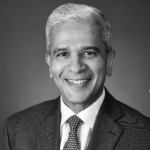If you were to stop anyone working at SunTrust and ask them, “What is the purpose of your role?” I'd wager that not only would they be able to give you an instantaneous answer, but that it would be the same answer. From the tellers in the branches to the engineers in IT, everyone's role is focused on achieving our purpose of lighting the way to financial well-being for our clients, teammates, communities, and shareholders.
Our mission came about several years ago when we began to ask questions about why we exist as a business. Consider that around 70 percent of the U.S. population suffers from some financial stress, and upwards of about 40 percent of the U.S. population doesn’t have a nest egg that they can fall back on in an emergency situation. This financial stress is a significant burden on a person's well-being. So we evolved our purpose based on the notion that everyone should have a life well spent, and financial well-being is a core component to that.
While some may think that lighting the way to financial well-being is the job of someone in the front office doing sales stuff, that’s simply not true. Technology is an essential component of meeting client needs in the financial industry.
For example, if a system is down, we can’t service our clients. And those clients are then put into potentially stressful situations. Maybe they were trying to close a deal with their lawyer. Maybe they were finalizing their mortgage. The point is that every single thing we do from a technology standpoint is all about meeting clients’ needs, so our purpose has to be front and center in everyone’s mind.
I find that the people who believe in that larger purpose have a strong sense of how they want to work and how they want to perform. And those individuals perform the best because they’re here to build the right answers for our clients.
An analogy I like to use to help visualize this is the difference between building a wall and building a hospital. Say you come across four builders, each laying brick on brick. The first builder says, “I'm building a wall.” This builder is probably moving slowly and inefficiently because he is not looking past the job currently at hand. The second builder says, “I'm building a room,” and this builder at least has a concept of the work he is doing. He’s there to build a room. The third builder says, “I’m not just building a room, I’m building a building, and this is what it’s going to look like when it's done.” Typically this builder will move a lot faster because he’s got a better sense of the overall architecture and the bigger picture.
And then there's the fourth builder, who says, “I’m not just building a building. I’m building a hospital to save children’s lives.” This builder's purpose is not building a wall, building a room, or building a building – it’s about saving children’s lives. And that individual is going to work harder and faster than any of the other builders.
When your teammates understand the higher purpose of the business – and they are held accountable to it – it gives them the ability to think more broadly than their day-to-day role. It empowers them to work creatively to find the best solutions to the problems at hand.





